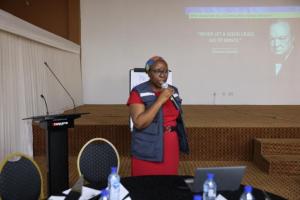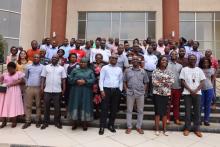Malawi convenes Cholera outbreak review
On August 16, 2023, the Ministry of Health declared Malawi’s biggest Cholera outbreak in history as a no longer a public health emergency. In line with the World Health Organization African guidelines on the aftermath of an outbreak, the Ministry of Health has convened After Action Review AAR meetings at sub-national level to review the Cholera outbreak. The AAR presents an opportunity to share lessons, challenges and best practices demonstrated by the response for continued improvement of outbreak management.
According to WHO’s Dr Gertrude Chapotera, the stepwise AAR guideline was developed for countries to use as they review and document how they responded to a particular emergency. As to what was done, what went well and what did not go well by establishing the enabling and limiting factors across the entire response.
“The process summarizes best practices to inform next response, formulate key recommendations to utilize on emergency preparedness of any upcoming emergency of similar nature. This process enables countries to identify gaps and develop standardized best practices for outbreak management cutting across all pillars of outbreak management. Risk communication and community management, surveillance, case management, supplies, operations, and logistics as well as the overall health management”, Chapotera said.
Dr Mira Khadka for UNICEF Malawi collaborates by stressing on the need to remember each action taken by running through a structured timeline going district by district to establish a common picture of the cholera outbreak. Starting at what was there before the outbreak to the point where the first case was registered. Recording the events as they happened in a sequence up until the management of the very last case to holistically appreciate the outbreak and interventions made to map out key milestones of the emergency.
Dickson Kazembe, Environmental Health Officer for Zomba district says it is an important process as it allows room for self-evaluation on what was missed out and how to do better. He mentions that this cholera outbreak was the first time Zomba has had registered cases from the Mental Hospital. The team from Zomba says it will adopt the process not only for the cholera outbreak but as a routine for health service delivery at district level and other future outbreaks using similar strategies and channels as standard practice.
Neno’s Disease Surveillance Cordinator Sekanawo Kapila elaborates that this process saves as a reminder for emphasis on prevention interventions as it recollects the memory of the gravity of the outbreak, underscoring on the need for preparedness for effective management of any health crisis. He cites that what the intervention that worked for Neno district was the game changer, installation of 640 chlorine dispensers across the district with support from WHO, Ministry of Health, Partners in Health and UNICEF.
Commenting on the issue Dr Limbani Mwapata a member of the Emergency Medical Team from Queen Elizabeth Central Hospital says the discourse dominating the After-Action Review from all districts exposes the need to have a centrally placed contingency fund for any disease outbreak that can significantly support government to address the outbreak whilst lobbying for support from developing partners.
Participants are Directors of Health Services, Environmental Health Officers, Medical Officers, Clinicians, Nurses, Pharmacists, Health Logisticians, Surveillance teams, Health Promotion and Communication Officers, Water and Sanitation Hygiene specialists and Immunization Officers.
At the end of this AAR process an After Action Review report will be formulated to ensure all lessons are captured and utilized to improve emergency preparedness and management capacities. This process is in alignment with the Global Roadmap targeting 90 percent reduction in Cholera deaths and elimination of cholera by 2030.




